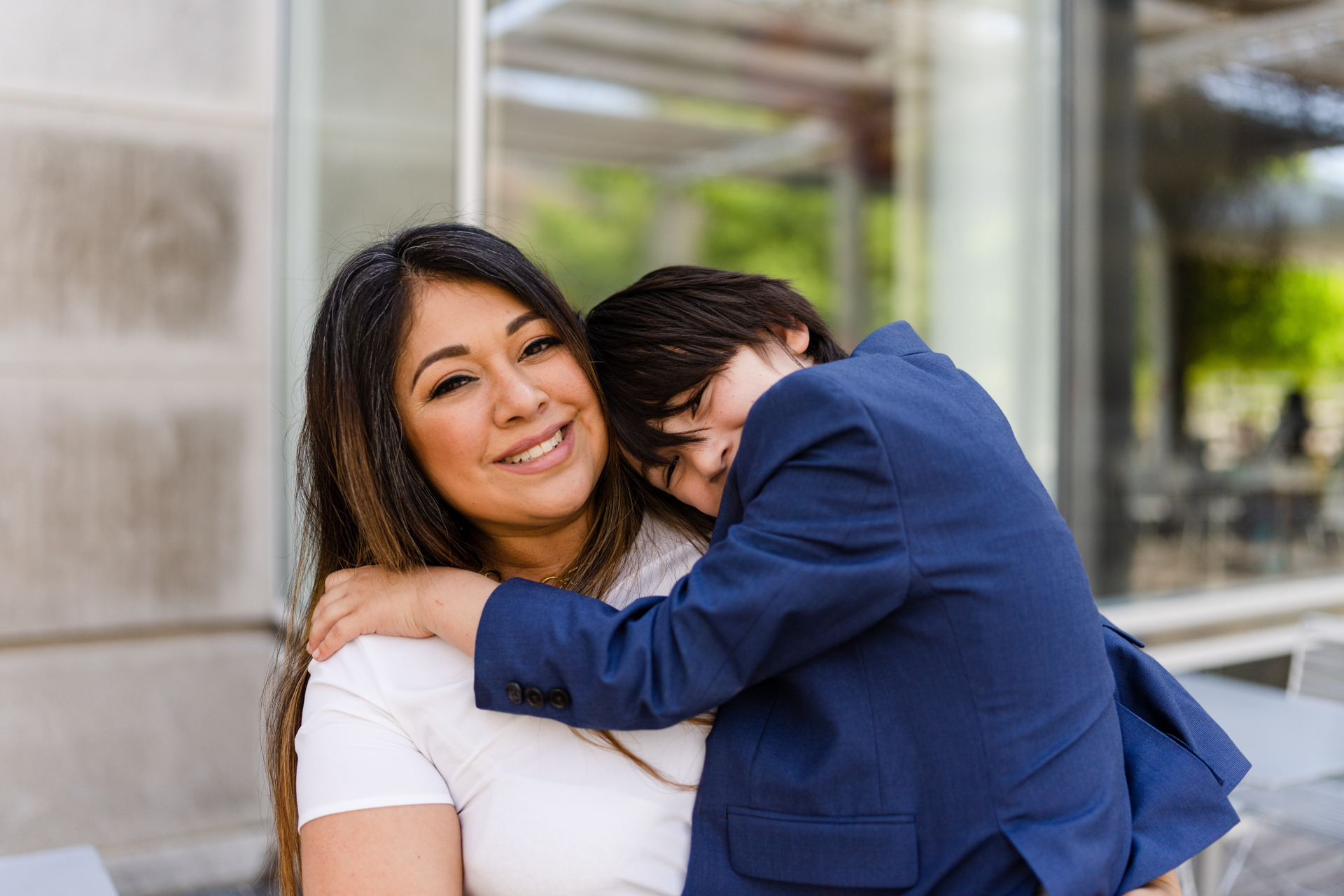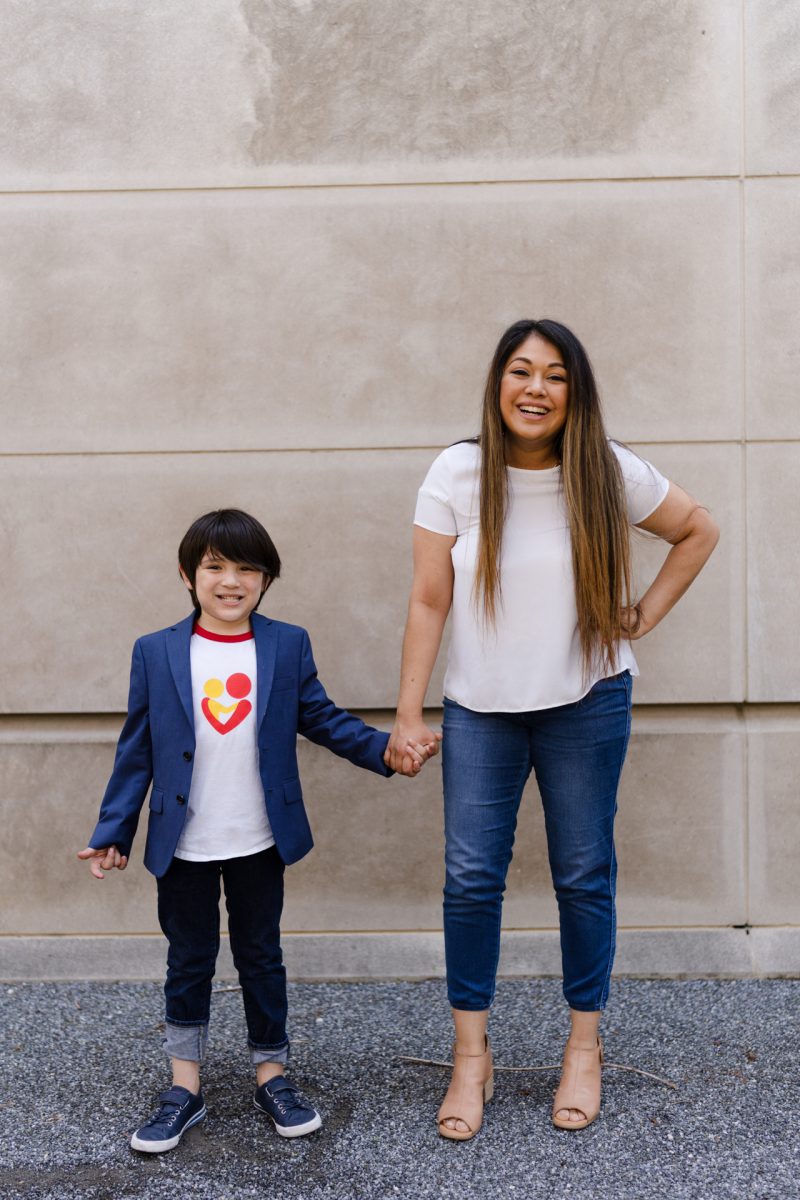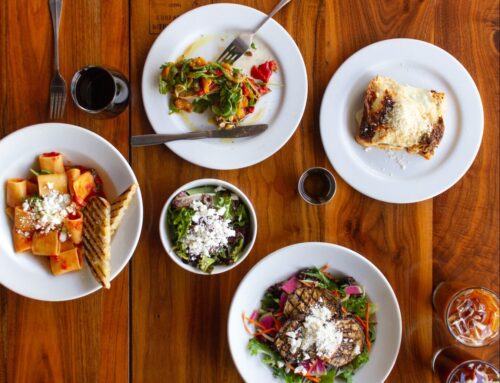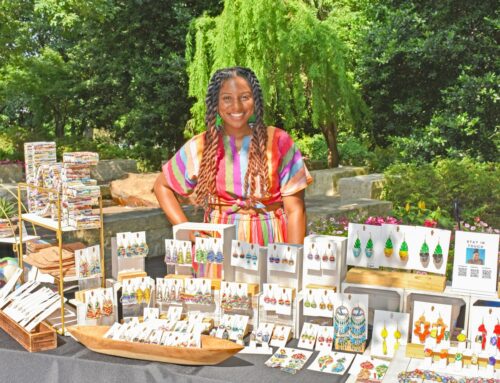
MaaPaa co-founders Nelly Cuenca and Bean. Photography by Corrie Aune.
On her first and only day at J.L. Long Middle School, Nelly Cuenca got beaten up by five other girls.
She later found out the violence was provoked because the boyfriend of one of the attackers had a crush on Cuenca. When Cuenca’s mother found out, she transferred her to a school in Mesquite ISD, where she was a minority, the daughter of Mexican immigrants in a mostly white community.
Cuenca came back to Dallas ISD for high school and attended Woodrow Wilson. The issues she witnessed there — drug activity and violence — are still present. It’s why Cuenca, who lives in East Dallas, decided to enroll her daughter at The Hockaday School rather than pursuing the public education route. Her daughter now attends Southern Methodist University.
Twice married, twice divorced and now in her 40s, Cuenca is self-employed. She trains companies on mental health first aid and also stays busy with her 6-year-old son, Bean.
Growing up without a father and rearing her son without one too was what prompted her and Bean last year to co-found MaaPaa, a nonprofit organization dedicated to helping single mothers of sons. The name comes from Bean, who combined “mama” and “papa.”
“There’s a lot of nonprofits that focus on girls — a lot. There’s not many that focus on boys,” Cuenca says. “Mine is specifically for boys that are being raised without a father.”
Realizing how many other single moms are rearing sons without fathers was another factor that played into creating MaaPaa.
“You can go to any company — go to Target, go to Amazon, go to any nonprofit, go to Mi Cocina — and you’re going to find a MaaPaa mom,” Cuenca says. “She’s working for you. She’s your peer. She’s your neighbor. She may be your bank teller. We’re absolutely everywhere.”
The nonprofit offers mental health first aid training — which teaches people how to identify, understand and respond to markers of mental illnesses and substance use disorders — and helps find grants to cover the cost of the program. Mothers can attend monthly support groups conducted in English and Spanish. And anyone who needs food can find it at a pantry at Vida Church, which was founded by MaaPaa board member and Woodrow alumna Rachelle Anderson.
MaaPaa recently launched a for-profit resale shop at Allen’s Grocery Market in southeast Dallas. It’s only about 400 square feet, but there are clothes for women and kids. All of it is donated to the shop, and if someone can’t pay for the needed items, they are freely given.
Bean’s age doesn’t stop him from getting involved in the nonprofit or starting his own initiatives. He attends all the support group meetings, which sometimes makes mothers nervous about discussing certain topics, especially those related to romantic partners. Bean wrote his first book, I Smell Like a Flower, when he was 5. After it was published, he spoke to 800 Dallas ISD students and told them if he could do it, they could do it, too.
Cuenca says Bean’s second book will help people better understand bipolar disorder, which his father, Cuenca’s ex-husband, has been diagnosed with, as a medical condition.

“I told my son, ‘We are not going to play the victim card. We are going to empower those around us, and we empower people by leading by example,’” she says. “It’s great to say, ‘Just listen.’ But people really need to see you lead by example.”
What are some misconceptions about “MaaPaa moms”?
One of the misconceptions is that you made a bad choice, that you’re uneducated. We’re such a powerful group. We are worldwide. I tell people all the time, if you do this right, you literally raise a Barack Obama, a LeBron James, a Michael Phelps. You raise an incredible man that’s going to give back to society. And that’s ultimately everyone’s goal. And you did it in a single-parent household. So kudos to you, mom. I am working on a book right now with other moms that have been there, done that, because I’m a baby coming in. I am literally walking in your steps right now. And I want to know what worked and what didn’t work.
How do mothers respond when you tell them they don’t necessarily need a boyfriend or husband?
They struggle with it because we have been conditioned to believe that we need a man in the house. We have been conditioned to believe, to be a home, it’s mom, dad, children. Bean actually reached out to PBS Kids and he said, “I love Clifford. I love Sesame Street. But I don’t feel seen with Pinkalicious, Clifford and Sesame Street.” He goes, “When can I become a series with you guys?” And of course, there’s red tape, there’s protocol. But we’re doing great. And we can just show other people, and you see it every single day like, oh, here’s a single mom killing it. But that’s not normal. Let’s emphasize Clifford, a big red dog. Let’s emphasize Pinkalicious with her pink wand, and everything turns pink. Why? Because we’re not ready for the truth. We’re not ready to acknowledge that women make more money, and we’re independent, and that we are the prize.
How can people support MaaPaa?
There’s so many ways: Mentorship for the MaaPaa mom or the MaaPaa boy, donations of clothing, school supplies. Bean started a library at age 3. We’ve given out more than 10,000 books. So if you want to donate books or do a book drive, we welcome that. We’re going to take about 50 students to Washington next year to teach them how to lobby. So if you want to sponsor a child, you can sponsor a child. And I always ask people to get creative. If you were raised by a single mom, what did your mom need? And then talk to me, so we can create that. You’d be surprised at how many men were raised in single-parent households. I need you: This is a call for all men raised in single-parent households. Please reach out to me. Let me know what you needed when you were growing up, and let me learn from your lived experience.
Interview has been edited for brevity.





